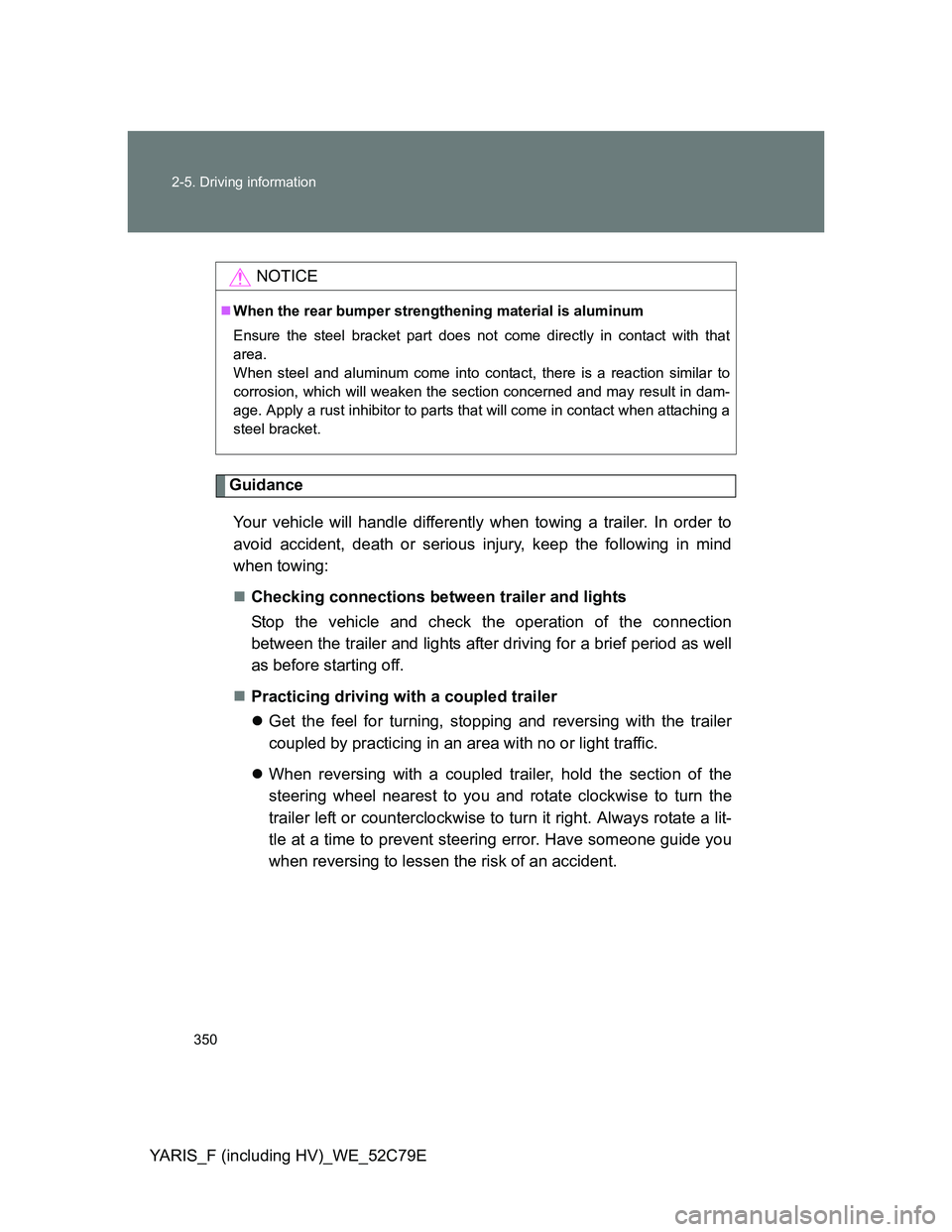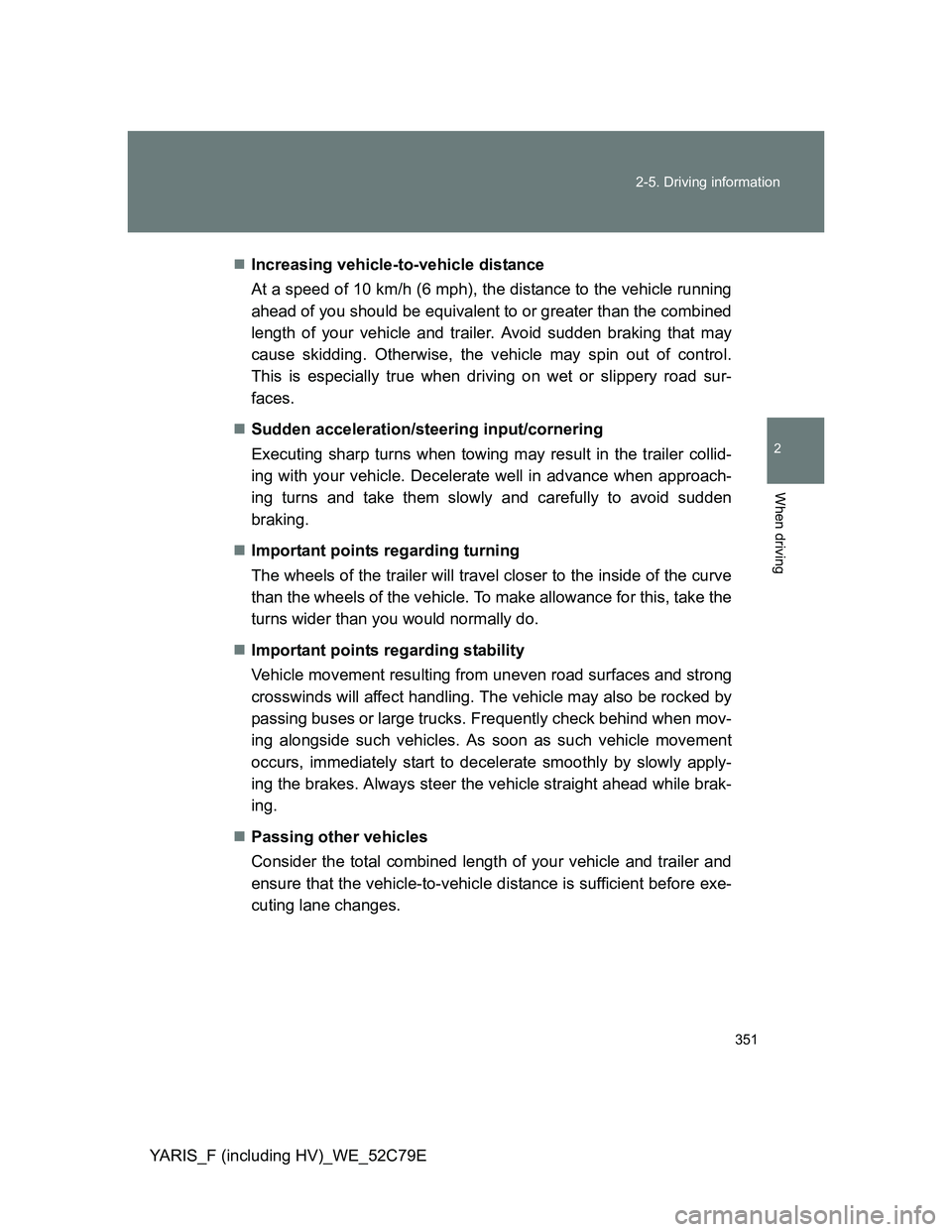Page 350 of 704

350 2-5. Driving information
YARIS_F (including HV)_WE_52C79E
Guidance
Your vehicle will handle differently when towing a trailer. In order to
avoid accident, death or serious injury, keep the following in mind
when towing:
Checking connections between trailer and lights
Stop the vehicle and check the operation of the connection
between the trailer and lights after driving for a brief period as well
as before starting off.
Practicing driving with a coupled trailer
Get the feel for turning, stopping and reversing with the trailer
coupled by practicing in an area with no or light traffic.
When reversing with a coupled trailer, hold the section of the
steering wheel nearest to you and rotate clockwise to turn the
trailer left or counterclockwise to turn it right. Always rotate a lit-
tle at a time to prevent steering error. Have someone guide you
when reversing to lessen the risk of an accident.
NOTICE
When the rear bumper strengthening material is aluminum
Ensure the steel bracket part does not come directly in contact with that
area.
When steel and aluminum come into contact, there is a reaction similar to
corrosion, which will weaken the section concerned and may result in dam-
age. Apply a rust inhibitor to parts that will come in contact when attaching a
steel bracket.
Page 351 of 704

351 2-5. Driving information
2
When driving
YARIS_F (including HV)_WE_52C79EIncreasing vehicle-to-vehicle distance
At a speed of 10 km/h (6 mph), the distance to the vehicle running
ahead of you should be equivalent to or greater than the combined
length of your vehicle and trailer. Avoid sudden braking that may
cause skidding. Otherwise, the vehicle may spin out of control.
This is especially true when driving on wet or slippery road sur-
faces.
Sudden acceleration/steering input/cornering
Executing sharp turns when towing may result in the trailer collid-
ing with your vehicle. Decelerate well in advance when approach-
ing turns and take them slowly and carefully to avoid sudden
braking.
Important points regarding turning
The wheels of the trailer will travel closer to the inside of the curve
than the wheels of the vehicle. To make allowance for this, take the
turns wider than you would normally do.
Important points regarding stability
Vehicle movement resulting from uneven road surfaces and strong
crosswinds will affect handling. The vehicle may also be rocked by
passing buses or large trucks. Frequently check behind when mov-
ing alongside such vehicles. As soon as such vehicle movement
occurs, immediately start to decelerate smoothly by slowly apply-
ing the brakes. Always steer the vehicle straight ahead while brak-
ing.
Passing other vehicles
Consider the total combined length of your vehicle and trailer and
ensure that the vehicle-to-vehicle distance is sufficient before exe-
cuting lane changes.
Page 352 of 704

352 2-5. Driving information
YARIS_F (including HV)_WE_52C79ETransmission information
Vehicles with a Multidrive and multi-mode manual transmission:
To maintain engine braking efficiency, when using engine braking,
do not use the transmission in D. Transmission shift gear position
must be in 4 in the M mode. (P. 255, 260)
Vehicles with a manual transmission:
To maintain engine braking efficiency, when using engine braking,
do not use the transmission in 5 and 6 (vehicles with a 6-speed
manual transmission) gear. (P. 265)
If the engine overheats
Towing a loaded trailer up a long, steep incline in temperatures
exceeding 30C (85F) may result in the engine overheating. If the
high engine coolant temperature warning light flashes or comes
on, turn the air conditioning off immediately, leave the road and
stop the vehicle in a safe place. (P. 635)
When parking the vehicle
Always place wheel chocks under the wheels of both the vehicle
and trailer. Firmly set the parking brake and shift the shift lever to P
for Multidrives, E, M or R for multi-mode manual transmissions,
and 1 or R for manual transmissions.
Page 355 of 704

3Interior features
355
YARIS_F (including HV)_WE_52C79E
3-1. Using the air conditioning
system and defogger
Manual air conditioning
system ............................ 356
Automatic air conditioning
system ............................ 363
Power heater .................... 372
Rear window and outside
rear view mirror
defoggers ....................... 374
3-2. Using the audio system
Audio system types .......... 376
Using the radio ................. 381
Using the CD player ......... 385
Playing back MP3 and
WMA discs...................... 390
Operating an iPod............. 396
Operating a
USB memory .................. 404
Optimal use of the audio
system ............................ 411
Using the AUX port ........... 413
Using the steering wheel
audio switches ................ 414
3-3. Using the interior lights
Interior lights list................ 417
• Personal lights ................ 418
• Interior light ..................... 4183-4. Using the storage features
List of storage features ..... 420
• Glove box ....................... 421
• Cup holders .................... 422
• Bottle holders.................. 423
3-5. Other interior features
Sun visors ......................... 425
Vanity mirrors.................... 426
Clock ................................. 428
Outside temperature
display ............................ 429
Portable ashtray................ 430
Cigarette lighter ................ 431
Power outlet ...................... 432
Seat heaters ..................... 434
Armrest ............................. 436
Panoramic roof shade....... 437
Assist grips ....................... 438
Floor mat........................... 439
Luggage compartment
features........................... 441
Page 377 of 704
377 3-2. Using the audio system
3
Interior features
YARIS_F (including HV)_WE_52C79E
Vehicles without a “touch screen”
CD player and AM/FM radio
The illustration below is for left-hand drive vehicles. Some button
positions are reversed for right-hand drive vehicles.
TitlePage
Using the radioP. 381
Using the CD playerP. 385
Playing back MP3 and WMA discsP. 390
Operating an iPodP. 396
Operating a USB memoryP. 404
Optimal use of the audio systemP. 4 1 1
Using the AUX portP. 413
Using the steering wheel audio switchesP. 414
Page 414 of 704
414
3-2. Using the audio system
YARIS_F (including HV)_WE_52C79E
Using the steering wheel audio switches
Turning on the power
Press when the audio system is turned off.
Changing the audio source
Press when the audio system is turned on. The audio source
changes as follows each time is pressed. If a mode cannot be
used, it will be skipped.
AMFMCD modeiPod or USB memory mode
*AUX*
*
: If equipped
: If equipped
Some audio features can be controlled using the switches on the
steering wheel.
Vo l u m e
Radio mode: Select radio
stations
CD mode: Select tracks and
files (MP3 and WMA)
iPod mode: Selects a song
USB memory mode:
Selects a file and folder
Power on, select audio
source
Page 416 of 704
416 3-2. Using the audio system
YARIS_F (including HV)_WE_52C79E
CAUTION
To reduce the risk of an accident
Exercise care when operating the audio switches on the steering wheel.
Page 445 of 704
4Maintenance and care
445
YARIS_F (including HV)_WE_52C79E
4-1. Maintenance and care
Cleaning and protecting
the vehicle exterior ......... 446
Cleaning and protecting
the vehicle interior .......... 451
4-2. Maintenance
Maintenance
requirements................... 454
4-3. Do-it-yourself maintenance
Do-it-yourself service
precautions ..................... 457
Hood ................................. 462
Positioning a floor jack ...... 464
Engine compartment......... 467
12-volt battery
(hybrid vehicle) ............... 487
Tires .................................. 494
Tire inflation pressure ....... 498
Wheels .............................. 500
Air conditioning filter ......... 502
Wireless remote control/
electronic key battery...... 505
Checking and replacing
fuses ............................... 510
Light bulbs ........................ 535